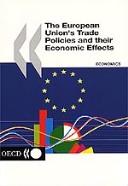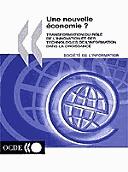| Listing 1 - 10 of 11 | << page >> |
Sort by
|
Article
Abstract | Keywords | Export | Availability | Bookmark
 Loading...
Loading...Choose an application
- Reference Manager
- EndNote
- RefWorks (Direct export to RefWorks)
Investment in information technologies has by no means been confined to the United States and yet, average European or Japanese growth experience has been quite different. The paper compares the impact of ICT capital accumulation on output growth in Australia, Canada, Finland, France, Germany, Italy, Japan, the United Kingdom and the United States. The analysis uses a newly compiled database of investment in ICT equipment and software based on the System of National Accounts 1993 (SNA93). Over the past two decades, ICT contributed between 0.2 and 0.5 percentage points per year to economic growth, depending on the country. During the second half of the 1990s, this contribution rose to 0.3 to 0.9 percentage points per year. The paper shows that, despite differences between countries, the United States has not been alone in benefiting from the positive effects of ICT capital investment on economic growth nor was the United States the sole country to experience an acceleration of these ...
Article
Year: 1996 Publisher: Paris : OECD Publishing,
Abstract | Keywords | Export | Availability | Bookmark
 Loading...
Loading...Choose an application
- Reference Manager
- EndNote
- RefWorks (Direct export to RefWorks)
The aim of this paper is two-fold: to highlight stylised facts about recent trends in the skill distribution of employment and to analyse the role that technological change might have in explaining these dynamics. Data on industrial employment broken down by occupation recently assembled by the OECD Secretariat are used to examine the changing skill composition of OECD economies, the occupational structure of industry and services, and the dynamics of upskilling. They show that in most OECD countries during the 1980s, employment grew fastest in high-skilled jobs and slowest – or declined – in low-skilled jobs. The upskilling trend is more apparent in manufacturing than in services, while overall the shift to higher skilled jobs has occurred primarily within industries, rather than between them. Econometric work that explores the role of technology in the changing skill mix in five of the G7 countries in the 1980s shows that upskilling has occurred faster in industries that have ...
Article
Year: 1996 Publisher: Paris : OECD Publishing,
Abstract | Keywords | Export | Availability | Bookmark
 Loading...
Loading...Choose an application
- Reference Manager
- EndNote
- RefWorks (Direct export to RefWorks)
The aim of this paper is two-fold: to highlight stylised facts about recent trends in the skill distribution of employment and to analyse the role that technological change might have in explaining these dynamics. Data on industrial employment broken down by occupation recently assembled by the OECD Secretariat are used to examine the changing skill composition of OECD economies, the occupational structure of industry and services, and the dynamics of upskilling. They show that in most OECD countries during the 1980s, employment grew fastest in high-skilled jobs and slowest – or declined – in low-skilled jobs. The upskilling trend is more apparent in manufacturing than in services, while overall the shift to higher skilled jobs has occurred primarily within industries, rather than between them. Econometric work that explores the role of technology in the changing skill mix in five of the G7 countries in the 1980s shows that upskilling has occurred faster in industries that have ...
Article
Abstract | Keywords | Export | Availability | Bookmark
 Loading...
Loading...Choose an application
- Reference Manager
- EndNote
- RefWorks (Direct export to RefWorks)
Investment in information technologies has by no means been confined to the United States and yet, average European or Japanese growth experience has been quite different. The paper compares the impact of ICT capital accumulation on output growth in Australia, Canada, Finland, France, Germany, Italy, Japan, the United Kingdom and the United States. The analysis uses a newly compiled database of investment in ICT equipment and software based on the System of National Accounts 1993 (SNA93). Over the past two decades, ICT contributed between 0.2 and 0.5 percentage points per year to economic growth, depending on the country. During the second half of the 1990s, this contribution rose to 0.3 to 0.9 percentage points per year. The paper shows that, despite differences between countries, the United States has not been alone in benefiting from the positive effects of ICT capital investment on economic growth nor was the United States the sole country to experience an acceleration of these ...

ISBN: 1280083581 9786610083589 9264188533 9264185364 Year: 1998 Publisher: Paris : OECD Publishing,
Abstract | Keywords | Export | Availability | Bookmark
 Loading...
Loading...Choose an application
- Reference Manager
- EndNote
- RefWorks (Direct export to RefWorks)
This paper retraces the Communities external liberalisation efforts, and discusses, where relevant, the repercussions of internal liberalisation on foreign competitors. The aim of the paper is to clarify, and when feasible, to quantify the economic effects of the EU’s trade policies. To this end, it provides an overview of past liberalisation efforts, reviews trade indicators in international comparison and lays out the future trade agenda of the Community. The empirical evidence provided in the paper points to little evidence for trade diversion due to integration in Europe, while trade is likely to have boosted area-wide income significantly. It is openness in general, rather than regional integration, that has favoured growth in Europe ...

ISBN: 9264276947 9264282122 9789264276949 Year: 2000 Publisher: Paris : OCDE,
Abstract | Keywords | Export | Availability | Bookmark
 Loading...
Loading...Choose an application
- Reference Manager
- EndNote
- RefWorks (Direct export to RefWorks)
AA / International- internationaal --- 338.023 --- 338.8 --- 338.043 --- 384.7 --- Arbeidsproductiviteit. --- Economische groei. --- Technologische vooruitgang. Automatisering. Computers. Werkgelegenheid en informatica. --- Tele-informatie. Datatransmissie. --- Innovations --- Societe informatisee --- Technologie de l'information --- Aspect economique --- Information technology --- Information society --- Technological innovations --- Société informatisée --- Economic aspects --- Aspect économique --- Arbeidsproductiviteit --- Economische groei --- Technologische vooruitgang. Automatisering. Computers. Werkgelegenheid en informatica --- Tele-informatie. Datatransmissie --- Innovations - Aspect economique - Pays de l'Organisation de cooperation et de developpement economiques --- Societe informatisee - Aspect economique - Pays de l'Organisation de cooperation et de developpement economiques --- Technologie de l'information - Aspect economique - Pays de l'Organisation de cooperation et de developpement economiques
Book
Year: 1998 Publisher: Paris, : OECD Publishing,
Abstract | Keywords | Export | Availability | Bookmark
 Loading...
Loading...Choose an application
- Reference Manager
- EndNote
- RefWorks (Direct export to RefWorks)
This paper retraces the Communities external liberalisation efforts, and discusses, where relevant, the repercussions of internal liberalisation on foreign competitors. The aim of the paper is to clarify, and when feasible, to quantify the economic effects of the EU's trade policies. To this end, it provides an overview of past liberalisation efforts, reviews trade indicators in international comparison and lays out the future trade agenda of the Community. The empirical evidence provided in the paper points to little evidence for trade diversion due to integration in Europe, while trade is likely to have boosted area-wide income significantly. It is openness in general, rather than regional integration, that has favoured growth in Europe.
Book
Year: 1998 Publisher: Paris, : OECD Publishing,
Abstract | Keywords | Export | Availability | Bookmark
 Loading...
Loading...Choose an application
- Reference Manager
- EndNote
- RefWorks (Direct export to RefWorks)
This paper retraces the Communities external liberalisation efforts, and discusses, where relevant, the repercussions of internal liberalisation on foreign competitors. The aim of the paper is to clarify, and when feasible, to quantify the economic effects of the EU's trade policies. To this end, it provides an overview of past liberalisation efforts, reviews trade indicators in international comparison and lays out the future trade agenda of the Community. The empirical evidence provided in the paper points to little evidence for trade diversion due to integration in Europe, while trade is likely to have boosted area-wide income significantly. It is openness in general, rather than regional integration, that has favoured growth in Europe.
Book
Year: 1999
Abstract | Keywords | Export | Availability | Bookmark
 Loading...
Loading...Choose an application
- Reference Manager
- EndNote
- RefWorks (Direct export to RefWorks)
Book
Year: 1998 Publisher: Paris, : OECD Publishing,
Abstract | Keywords | Export | Availability | Bookmark
 Loading...
Loading...Choose an application
- Reference Manager
- EndNote
- RefWorks (Direct export to RefWorks)
This paper retraces the Communities external liberalisation efforts, and discusses, where relevant, the repercussions of internal liberalisation on foreign competitors. The aim of the paper is to clarify, and when feasible, to quantify the economic effects of the EU's trade policies. To this end, it provides an overview of past liberalisation efforts, reviews trade indicators in international comparison and lays out the future trade agenda of the Community. The empirical evidence provided in the paper points to little evidence for trade diversion due to integration in Europe, while trade is likely to have boosted area-wide income significantly. It is openness in general, rather than regional integration, that has favoured growth in Europe.
| Listing 1 - 10 of 11 | << page >> |
Sort by
|

 Search
Search Feedback
Feedback About UniCat
About UniCat  Help
Help News
News